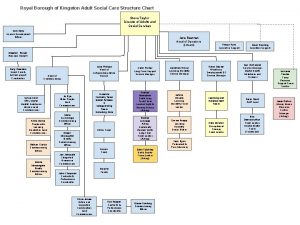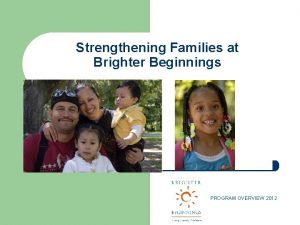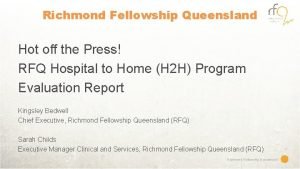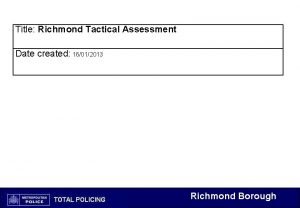Richmond and Kingston ME Group How can we















- Slides: 15

Richmond and Kingston ME Group How can we better support people with ME/CFS?

How can we better support people with ME? ME (Myalgic Encephalomyelitis) also diagnosed as CFS (Chronic Fatigue Syndrome)

Understanding ME � The medical cause of ME is still unknown. � No diagnostic test, no biomarker and no cure. � Classified by the World Health Organisation (WHO) as a neurological disease. MEA describes abnormalities in the central nervous, immune and endocrine systems. � Diagnosed by specialists excluding other health conditions which may cause similar symptoms. � Can affect anyone at any age and from any ethnic group. � Estimated 250, 000 people have ME in the UK. 1, 300 in Richmond and Kingston boroughs. � At least 25% are so severely affected they are housebound or bedbound.

Prognosis – The Group’s Survey �ME is a long term condition. �NICE Guidelines estimate only 5 -10% ever make a full recovery. �Thanks to the support of Hampton Fuel Allotment Charity, Richmond Parish Lands Charity, Love Kingston and Waitrose for funding our survey. � 70 members completed the questionnaire with 48 questions in 2019, giving a response rate of 43. 75%.

The Group’s Survey �Average duration of illness was over 19 years (range from 3 to 57 years). �Time taken to gain a diagnosis was just over 3. 5 years for the sample as a whole, varying from one month to 27 years. �More than 40% of the respondents stated that their ME was severe or moderate when at its worst. �A third of respondents reported that their ME had deteriorated over the past year; 37% reported a fluctuating illness course. �Extreme fatigue/exhaustion was the most troubling symptom in the surveyed sample, followed by postexertional malaise and cognitive difficulties.

ME Symptoms Extreme overwhelming disabling fatigue: “The name chronic fatigue doesn’t even begin to cover the condition and it makes it sound like something you could take a sleeping pill for – if only!!!” Muscle Fatigue: “I can hardly walk at all, weakness and feeling as if I am going to pass out are some of my symptoms”

ME Symptoms �Post-exertional malaise (PEM) hallmark of illness. “I still do too much when I feel good and then have to pay for it afterwards and often have several days when I can hardly move and feel very unsociable, not the old me at all…. Because there is nothing different visually, people find it very difficult to understand that one day I appear normal and another I cannot move about and struggle with conversation and remembering normally simple things. ”

Symptoms: Cognitive Dysfunction � Concentration: “I now often forget what I’m trying to say halfway through a sentence. ” � Sensory overload: “. . high sensitivity to sensory input (noise, light, smell) and memory loss and confusion means I can’t go out of the house alone. ” � Brain Fog: “Sometimes my head is so foggy I can’t process info. so talking on the phone is difficult” � Unrefreshing sleep, dizziness, memory impairment, insomnia.

ME Symptoms �Muscle and joint pain. �Headaches. �Neuropathic pain. �Widespread and Migratory. More severe after exertion or activity (physical, mental or emotional) and generally does not respond to standard painkillers. Other symptoms are Orthostatic Intolerance (rapid heartbeat, palpitations, chest pain, nausea, poor blood pressure regulation), IBS, migraines, sweats, inability to move (paralysis).

Effects of ME on Daily Life • Employment: 83% of survey respondents had disruption in their employment status due to ME, with a 47% unable to work at all, 19% part time or less, only one person full time. • Education: 1 in 7 respondents had to use distance learning or special adjustments in order to complete their education or could not complete school age 16 or higher education. • Mobility: 83% of respondents had mobility restrictions. • Family Life: 85% of respondents had difficulties with family responsibilities.

Managing ME & COVID-19 Rest is the cornerstone to stabilising the condition and any chance of improvement. Pushing to do more can be detrimental. COVID-19 is leaving some patients with Post. Viral Fatigue Syndrome (PVFS), which suggests that more rest and pacing is needed for them, avoiding overactivity, in order to prevent any development of ME.

NHS and GPs Support • 93% of respondents were formally diagnosed by a doctor, 3 in • • 8 were not screened for secondary co-morbidities, nearly 70% did not receive NHS medical care for their ME symptoms and nearly a quarter were refused NHS tests, treatments or referrals. 1 in 5 stated that their GPs were unsupportive, 3 in 5 said GPs were supportive but couldn’t help with their ME and nearly 1 in 5 said their GPs were supportive and informed. 1 in 7 was currently seeing a consultant about their ME, half of the sample had been referred to a consultant but discharged still feeling ill, only 1 in 14 patients was discharged when improved, a quarter had never been referred to a consultant. 3 in 8 were never referred to a specialist NHS ME/CFS clinic. 1 in 7 didn’t receive the medical care they needed at home. Only 4 respondents were given the option of home visits.

Housing, Support, Welfare Benefits • 1 in 14 respondents had to leave their houses due to care needs, 1 in 9 due to reduced incomes, 1 in 9 due to other reasons. One person due to losing housing benefit. • 30% of the sample had a carer, 1 in 14 needed one but gave up in the process, one person was refused care, 41% had unmet care needs. A couple of members said: “GP laughed at me when I asked for a ‘support worker’. NHS simply dismissed my requests. ” “I need more care, but I find it exhausting which defeats the object. Also expensive. ” • 14% of respondents felt slightly isolated due to symptoms and limitations; 73% significantly isolated. • 1 in 6 had their symptoms worsened due to changes in the benefits system, 1 in 7 had their income level decreased with 3 people experiencing hardship, 1 in 14 gave up in the process.

Recommendations For GPs, Social Care System and NHS: � Read the Purple Book from the ME Association. � Be more supportive with more acceptance, awareness and understanding of ME. � Provide medical care for ME symptoms without refusing referrals to the right specialist, consultant, ME/CFS clinics and/or medication. Easy referral to Social Services. Access to carers as many can’t do much by themselves. � The inclusion of ME/CFS in initial and in service training for all medical professionals, especially now when COVID-19 is leaving many patients with Post Viral Fatigue Syndrome. � Health professionals to recommend their patients to contact us (or their local support groups) in order to reduce their social isolation. � Read the two-page recommendations based on results of the R&K ME Group Survey accompanying the report for more suggestions.

Questions? Someone who listens is gold dust to a person with ME, who has often been ignored or misbelieved.
 6th richmond hill scout group
6th richmond hill scout group Aquajet kingston
Aquajet kingston Adult social care kingston
Adult social care kingston Kingston traffic report
Kingston traffic report Professor margaret kingston
Professor margaret kingston Jps ecommerce kingston 5
Jps ecommerce kingston 5 Kingston na jachcie
Kingston na jachcie Joseph lawrence chung mei
Joseph lawrence chung mei Martin kingston qc
Martin kingston qc Kingston strategic partnership
Kingston strategic partnership Engelbert stockhammer
Engelbert stockhammer Kingston planning scheme
Kingston planning scheme Newrichmond skyward
Newrichmond skyward 601 s belvidere st richmond va
601 s belvidere st richmond va Brighter beginnings richmond
Brighter beginnings richmond Kingsley bedwell
Kingsley bedwell




























